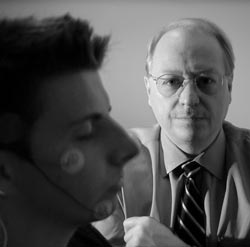Taking Earth to Mars: Sleep and Circadian Cycles in Space
David Dinges, Ph.D., Professor of Psychology in Psychiatry, Chief of the Division of Sleep and Chronobiology in the Department of Psychiatry, and Associate Director of the Center for Sleep and Respiratory Neurobiology in the Perelman School of Medicine
Dr. Dinges' laboratory is dedicated to scientific discovery of the physiological, cognitive and functional changes resulting from sleep loss and behavioral stressors in humans, and to evaluating behavioral, pharmacological and technological countermeasures to these effects. His research has primarily focused on the manner in which neurobiology regulating sleep homeostasis and circadian rhythmicity control cognitive, affective, behavioral, endocrine and immunological processes in humans. His research has involved extensive laboratory, simulator and field studies on the consequences of sleep loss and circadian misalignment from both lifestyle and medical disorders; effects of sleep disorders; recovery potential of naps; nature of sleep inertia; impact of cumulative sleep debt; differential vulnerability to the neurobehavioral effects of sleep loss; and development of technologies for monitoring human neurobehavioral capability, such as the widely used the Psychomotor Vigilance Test (PVT). He has over 230 publications and his scientific work has been funded for 30 consecutive years by numerous Federal Agencies, including NIH, NASA, DOD, DOT, and DHS, as well as private foundations.
The luncheon is at 12:00 noon on Wednesday, January 23, 2013 in the Lenape Room of the University Club.


